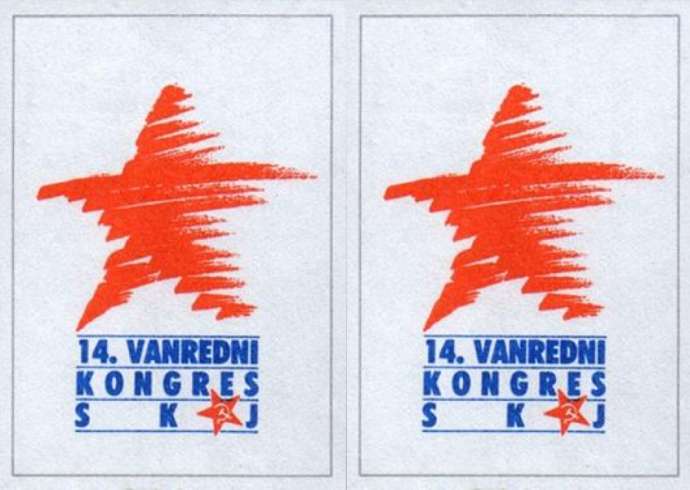STA, 22 January 2020 - Thirty years to the day, the Slovenian delegation walked out of the 14th Congress of the League of Communists of Yugoslavia in Belgrade, in what participants as well as historians deem one of the key moments in the dissolution of Yugoslavia, one that presaged Slovenia's independence.
The delegates of the League of Communists of Slovenia walked out of the congress on the third day of sessions following the rejection of all of their proposals.
Slovenian representatives had called for more autonomy of party organisations in Yugoslav republics and had several proposals aimed towards greater democratisation of Yugoslavia and decentralisation of the League of Communists.
The remaining delegates reacted to the walkout with applause, laughter or boos, with the Belgrade unit of the national television labelling the move as an ill-advised act of separatism.
Following the walkout, the head of the Croatian delegation Ivica Račan proposed that the congress be suspended until the party organisations of the republics examined the situation and found solutions.
The head of the Serbian League of Communists, the future Serbian President Slobodan Milošević, said that this would constitute a dissolution of the congress and called on the remaining delegates to continue the session.
The congress was suspended in less than a week as it was held without representatives of Slovenia, Croatia and Macedonia, in what many see as the start of the disintegration of the League of Communists of Yugoslavia.
The 30th anniversary of the event was marked with a ceremony on Monday hosted by President Borut Pahor, who was among the almost 120 Slovenian delegates to leave the congress on 22 January 1990.
Sociologist Franci Pivec said that the walkout had effectively ended the congress and practically excluded the "ever present" Central Committee of the party from political developments.
Pivec, who was also among the Slovenian delegates, noted that the exclusion of the the League of Communists of Yugoslavia from the political developments at the time was a major event in the run-up to Slovenia's independence.
A month ahead of the congress, the League of Communists of Slovenia adopted a document in which it "expressed its full programme of independence" and called for more Europe-oriented policies in Yugoslavia.
"We came to Belgrade determined that we are going to Europe with Yugoslavia, or without it, if they don't want to go," said Pivec.
He added that even before the congress, it had been clear that the League of Communists of Yugoslavia was "increasingly identifying itself with political views of a military junta" and "openly opposing democratisation."
Ciril Ribičič, the then president of the League of Communists of Slovenia and head of the Slovenian delegation at the congress, said that the plan was to convince others of the need to reform society and the ruling party.
He believes that leaving the congress was the right decision, as "many who were on the opposing side at the event are now sitting in the waiting room for the EU."
Ribičič admitted that it was not simple to maintain unity about the right moment for the walkout, but the delegates nevertheless had left the congress "united, with heads held high and even more convinced that we are on the right path."
President Pahor said that the walkout did not mean that Slovenian communists "returned to Ljubljana with a clear vision that we want to have a Slovenian state".
But the decision did force them to think about alternatives, while at the same time "weakening the federal authorities, in effect lessening their resistance to the democratic aspirations of Slovenians."
Slovenian leaders had diverging views at the beginning of 1990, but the achieved unity, later confirmed at the independence referendum in December, should nevertheless be seen as something exceptional, Pahor added.
In the run-up to the independence referendum, Slovenia declared economic independence from Yugoslavia in March 1990, and the following months a coalition of centre-right called DEMOS won a majority in the first democratic elections in Slovenia.
Following the decisive referendum in favour of independence on 23 December 1990, Slovenia declared independence on 25 June 1991, which was followed by the Ten-Day War and eventual independence from Yugoslavia.






